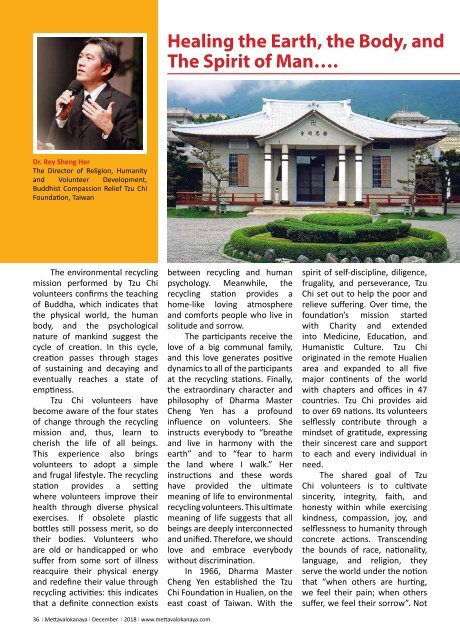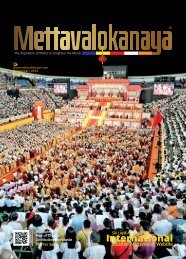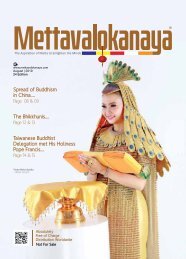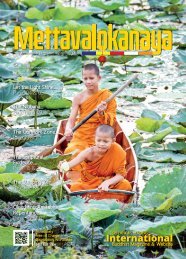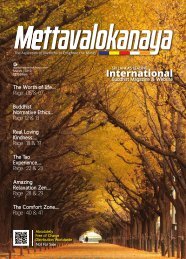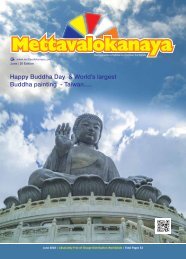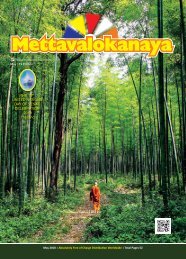Mettavalokanaya_Buddhist_Magazine_December_2018.
“Mettavalokanaya” International Monthly Buddhist Magazine has been successfully distributed to 40 countries including all districts across Sri Lanka and now “Mettavalokanaya” is Sri Lankan Most Popular & Leading monthly Buddhist Magazine.
“Mettavalokanaya” International Monthly Buddhist Magazine has been successfully distributed to 40 countries including all districts across Sri Lanka and now “Mettavalokanaya” is Sri Lankan Most Popular & Leading monthly Buddhist Magazine.
Create successful ePaper yourself
Turn your PDF publications into a flip-book with our unique Google optimized e-Paper software.
Dr. Rey Sheng Her<br />
The Director of Religion, Humanity<br />
and Volunteer Development,<br />
<strong>Buddhist</strong> Compassion Relief Tzu Chi<br />
Foundation, Taiwan<br />
The environmental recycling<br />
mission performed by Tzu Chi<br />
volunteers confirms the teaching<br />
of Buddha, which indicates that<br />
the physical world, the human<br />
body, and the psychological<br />
nature of mankind suggest the<br />
cycle of creation. In this cycle,<br />
creation passes through stages<br />
of sustaining and decaying and<br />
eventually reaches a state of<br />
emptiness.<br />
Tzu Chi volunteers have<br />
become aware of the four states<br />
of change through the recycling<br />
mission and, thus, learn to<br />
cherish the life of all beings.<br />
This experience also brings<br />
volunteers to adopt a simple<br />
and frugal lifestyle. The recycling<br />
station provides a setting<br />
where volunteers improve their<br />
health through diverse physical<br />
exercises. If obsolete plastic<br />
bottles still possess merit, so do<br />
their bodies. Volunteers who<br />
are old or handicapped or who<br />
suffer from some sort of illness<br />
reacquire their physical energy<br />
and redefine their value through<br />
recycling activities: this indicates<br />
that a definite connection exists<br />
Healing the Earth, the Body, and<br />
The Spirit of Man….<br />
between recycling and human<br />
psychology. Meanwhile, the<br />
recycling station provides a<br />
home-like loving atmosphere<br />
and comforts people who live in<br />
solitude and sorrow.<br />
The participants receive the<br />
love of a big communal family,<br />
and this love generates positive<br />
dynamics to all of the participants<br />
at the recycling stations. Finally,<br />
the extraordinary character and<br />
philosophy of Dharma Master<br />
Cheng Yen has a profound<br />
influence on volunteers. She<br />
instructs everybody to “breathe<br />
and live in harmony with the<br />
earth” and to “fear to harm<br />
the land where I walk.” Her<br />
instructions and these words<br />
have provided the ultimate<br />
meaning of life to environmental<br />
recycling volunteers. This ultimate<br />
meaning of life suggests that all<br />
beings are deeply interconnected<br />
and unified. Therefore, we should<br />
love and embrace everybody<br />
without discrimination.<br />
In 1966, Dharma Master<br />
Cheng Yen established the Tzu<br />
Chi Foundation in Hualien, on the<br />
east coast of Taiwan. With the<br />
spirit of self-discipline, diligence,<br />
frugality, and perseverance, Tzu<br />
Chi set out to help the poor and<br />
relieve suffering. Over time, the<br />
foundation’s mission started<br />
with Charity and extended<br />
into Medicine, Education, and<br />
Humanistic Culture. Tzu Chi<br />
originated in the remote Hualien<br />
area and expanded to all five<br />
major continents of the world<br />
with chapters and offices in 47<br />
countries. Tzu Chi provides aid<br />
to over 69 nations. Its volunteers<br />
selflessly contribute through a<br />
mindset of gratitude, expressing<br />
their sincerest care and support<br />
to each and every individual in<br />
need.<br />
The shared goal of Tzu<br />
Chi volunteers is to cultivate<br />
sincerity, integrity, faith, and<br />
honesty within while exercising<br />
kindness, compassion, joy, and<br />
selflessness to humanity through<br />
concrete actions. Transcending<br />
the bounds of race, nationality,<br />
language, and religion, they<br />
serve the world under the notion<br />
that “when others are hurting,<br />
we feel their pain; when others<br />
suffer, we feel their sorrow”. Not<br />
only do the volunteers endeavor<br />
to promote the universal value<br />
of “Great Love,” they also<br />
fully employ the humanitarian<br />
spirit of Chinese culture to its<br />
utmost. Tzu Chi Foundation’s<br />
“Four Major Missions” consist<br />
of Charity, Medicine, Education,<br />
and Humanity. Furthermore,<br />
considering ongoing efforts<br />
in Bone Marrow Donation,<br />
Environmental Protection,<br />
Community Volunteerism,<br />
and International Relief, these<br />
eight concurrent campaigns are<br />
collectively known as “Tzu Chi’s<br />
Eight footprints”<br />
Truth and Majority….<br />
Hannah Arendt stated in her<br />
book "The Promises of Politics"<br />
that "Once you introduce the<br />
eternal truth to the public,<br />
it becomes one of the many<br />
opinions and thus the eternal<br />
truth turns into temporary." From<br />
the perspective of Hannah Arendt,<br />
the truth does not derive from the<br />
decision of majority, the opinion<br />
does. But opinion is temporary,<br />
uncertain and varies from time<br />
and place; the truth is eternal,<br />
although it has been very often<br />
eliminated or distorted by public<br />
opinion. Socrates was one of the<br />
greatest Greek sages and was<br />
the most influential philosopher<br />
of his age and in the times of<br />
Renaissance. We can name him<br />
as one of the wisest people in<br />
the history of mankind. Most of<br />
Socrates' works were edited by<br />
his pupil, Plato, and presented<br />
in the form of a dialogue. In the<br />
time of ancient Greece, there<br />
were many sophists; it was the<br />
most democratic age in antiquity.<br />
However, ironically, it was the<br />
democracy of Athens which killed<br />
Socrates.<br />
The eloquence of Socrates<br />
and his cutting-edge analysis were<br />
perceived by Athenians as those<br />
of contaminated young men. His<br />
persuasive statement of truth<br />
was deemed to offend Apollo, the<br />
God of ancient Greece. Athenians<br />
used a very democratic method<br />
to choose 501 jurors out of its<br />
more than 20,000 citizens and<br />
organized a trial for Socrates.<br />
281 out of the 501 reached the<br />
verdict that sentenced Socrates<br />
to death. His friends and pupils<br />
had arranged his escape but he<br />
declined, saying: "I would rather<br />
die innocent and not escape<br />
like a criminal." He followed the<br />
trial's request to drink a poison<br />
and died. Eloquence like that<br />
of Socrates can elucidate the<br />
truth through dialectic dialogue;<br />
many intellectuals perceive this<br />
as the best way to seek truth.<br />
But the truth was defeated by<br />
"Democracy". The collective<br />
intelligence of the public was far<br />
behind the wisdom of Socrates<br />
and, sadly, they collectively killed<br />
the wisest man of their time.<br />
The example of Athens<br />
provides a clear example of<br />
how eternal truth cannot<br />
be determined by votes of a<br />
majority. The death of Socrates<br />
shows us that the genuine truth<br />
shall be reached through debate.<br />
Dialectic dialogue will not<br />
diminish differences but deepen<br />
them. To express the true ideas<br />
cannot reconcile the divergences<br />
between beliefs and ideologies.<br />
Socrates aimed to seek scientific<br />
truth and its objectivity; this was<br />
understood to be the denial of<br />
God. Although he won almost<br />
every debate, his explanation<br />
of truth became the crime of<br />
which he was charged. Hannah<br />
Arendt concluded from the fate<br />
of Socrates that public opinion<br />
cannot replace truth. Truth only<br />
belongs to a few wise prophets.<br />
Therefore, she believed that the<br />
dialectic discourse is the only and<br />
best way to expound the truth;<br />
we should not depend upon the<br />
majority's opinion to construct<br />
truth. Nonetheless, if truth<br />
cannot be understood by the<br />
public, how can one inspire the<br />
public to know the truth? How<br />
will a prophet eliminate the bias<br />
and wrong perceptions of the<br />
public and eventually guide them<br />
to enlightenment?<br />
Truth and Dialogue….<br />
We shall limit the issue to the<br />
ways to diminish divergences and<br />
bias and to elaborate methods<br />
to reach mutual understanding<br />
among different ideologies and<br />
beliefs? Moreover, will there be<br />
any common truth that can be<br />
accepted by different religions<br />
and belief groups? If this will<br />
neither come out through<br />
dialectic discourse nor by the<br />
vote of the majority, how will it<br />
appear? Hannah Arendt believed<br />
that Socrates was the founder of<br />
dialectic discourse to find truth<br />
and that his dialectic discourse<br />
was based on the principle of<br />
friendship. Socrates expected to<br />
build friendships with the citizens<br />
of Greece and not to compete<br />
with them. From his viewpoint,<br />
dialogue was the way to construct<br />
friendship; but Athens was a<br />
competitive and saturated city.<br />
Its citizens were eager to prove<br />
that they were best and on the<br />
right side in public life. It is very<br />
similar to our modern world<br />
in which we all live in a very<br />
competitive and saturated city<br />
and every one of us tries to gain<br />
advantages and promote beliefs<br />
through the public discourse of<br />
the democratic system. The Greek<br />
prophets, including Socrates,<br />
Plato and Aristotle, believed that<br />
to construct a community had to<br />
be based on friendship instead of<br />
justice. The definitions of justice<br />
vary from people to people; it is<br />
only through friendship that we<br />
can build a shared community.<br />
36 l <strong>Mettavalokanaya</strong> l <strong>December</strong> l 2018 l www.mettavalokanaya.com www.mettavalokanaya.com l 2018 l <strong>December</strong> l <strong>Mettavalokanaya</strong> l 37


